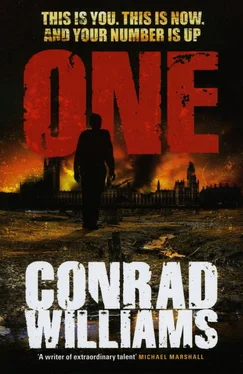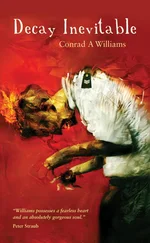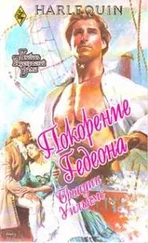Erubiel used to tap Jane on the head whenever he wanted his attention. He did it all the time. Tap, tap, tap. He was doing it now. And that was funny, because Erubiel had ended up in a wheelchair. Jane had received a postcard from his father a couple of years later when Jane had been building a reputation with his burning gear on drilling rigs near the Shetlands. There had been an accident on a rig in Campeche Sound. A gas leak. A dozen men had died. Erubiel leapt from the rig and the drop crushed his spine. Now he could sit and watch girls all day, but that was pretty much all he could do.
Tap, tap, tap.
Pack it in, Ruby. Give it a rest .
Jane opened his eyes. His head was slapping against the edge of the chair. But it was more rhythmical now, less violent. Gone was the arbitrary shearing of deep-sea currents, a sickening, jolting pitch and yaw. This was a shallow-water beat. This was land ahoy.
He scrabbled for the harness release and tumbled out of his chair to the floor, which was now the portside wall. He couldn’t see anything out of the porthole there; starboard was the queasy flux of the sky. But at least the howling had stopped. He staggered through the ruins of the boat, remembering to snatch up the green First Aid box. His legs felt as though they might pitch him into the slough of filth beneath him; he was grateful to have become inured to the stench hours ago. Hours. How long had he been asleep? How long had he drifted? He checked his watch. Midday. 7th December. Five days since he and his crew had lumbered back to the diving bells, panic at their heels. Where had that time gone? He must have spent most of it unconscious. He checked the gauge on the oxygen tanks and jammed the regulator back in his mouth. Hunger and thirst slapped him around the face while he struggled to spin open the hatch wheel. Steak and eggs and fried potatoes and a pint of best bitter. He pulled on a pair of latex gloves. A last look out of the porthole. He jerked up the hood on his coverall, readjusted his diving mask and pushed open the door.
It took a long time to get used to the still ground. For a while Jane trudged around on the beach where he had fetched up, the uncertainty of his tread in the sand a weird kind of comfort, a training ground for his balance. Part of his hanging around near the boat was down to his not being sure where he was. He didn’t know if this was the UK, or Norway, or Nova Scotia. He didn’t know what to do. The brutality of the wind on the oil platform had not followed him here, but it was still rough. It was hot, too, like the blast you got when you opened an oven to check the pizzas weren’t burning.
He hid his face from the squalls of rain, but occasionally some of it would bite him and he’d have to swipe it away quickly with his gloved hands before it started to burn. Holes began to appear in the latex. He discarded them quickly. What the fuck was this? What the fuck had happened?
After a while spent scanning an horizon that resembled more the jag of an oscilloscope reading, Jane scrambled up an embankment of brown grass. The land appeared to have been sanded back to polished lava. He couldn’t see much once he’d breasted the rise; a mist clung to the headland, erasing all but the darkest shadows of the near coast in both directions. He could see a road though, and he hurried towards it. British tarmac, he was sure. He felt a pulse of optimism. He was on home turf, at least. He got onto the road and saw a car parked half a mile to the north, slewed across both lanes as if it had braked suddenly, and hard. He trotted gamely towards it – UK number plate, which was a boon of sorts – but gradually his speed faltered as he saw the passengers. Both had attempted to get out of the car. One had succeeded but was lying on his back about ten feet away, a mousse of lung tissue and blood streaked across his face and shirt. His companion was still buckled in, although the strap had disappeared into the soufflé of her flesh. Her eyes drilled into him, poached, piscine. Her hand was a lobster claw hooked into the catch of the door. Both of them glittered like pixie-dust confections. The woman’s head was jerking in the fierce slaps of wind, her charred hair jinking on a red-raw scalp like a fright wig. The tyres of the car had melted into the road. So whatever had killed his colleagues on the platform had done for these too. Not isolated, then. So, what? Nuclear? Was this a nuclear attack? Was this chemical warfare? Was this biological?
Jane reached into the car, hands shaking, and tried not to look at the woman any more. He was glad of his face mask, that he didn’t have to smell her. He turned the key, but, as he expected, there was no response from the engine. Backing away, he swung his gaze north, wondering if he should head up to Aberdeen, but his initial impulse was to find immediate shelter, maybe a phone that still worked. Maybe a car or a motorbike. He followed the road south and his heart lifted to find a row of pretty cottages behind a bluff of land. A small harbour with a surrounding stone wall. Small boats had become driftwood. There were bodies in there too, face down. He wasn’t sure if he should be grateful for that.
At the first of the stone cottages, he peered through the window, but there was nobody to be seen. He knocked on the door and the sound startled him. The skin on the back of his hands was striated, as if he had thrust it into a bed of thorns. Nobody was coming to answer. It didn’t matter how many doors he tried. He rested his forehead against the blistered wood for a second. Closed his eyes. He went around the side of the house to the back. He climbed over the fence into a neatly tended garden. The lawn was a fried brown square. Washing on a line was pitted and scorched. A man was on his knees, toppled over against a chimney pot that contained a plant now little more than a few black tongues. The man’s left hand was distended; blood had flowed and dried around the vanishing tourniquet of a watch strap. His fingers were purple, swollen and shiny like baby aubergines. Attached to a kennel by a chain, a peeled thing with too many teeth lay on its side, flanks scorched down to purple bone.
Jane strode past the man and pushed open the back door. The kitchen was halved by light that no longer existed. Whatever had torn across the coast had left an impression of itself here, like the discoloration that sunshine creates on the cover of a forgotten book on a windowsill, only much, much more swiftly. The dining table was a duotone of caramel and coffee. The plastic jug of a fruit-juicing machine had turned into a molten Dali nonsense. Envelopes on the table showed him where he was: Burnmouth, Berwickshire, which he knew to be a good 200 miles south of Aberdeen.
He moved through the house, checking each room, but he didn’t know what he was seeking. He saw the shape of a child’s bed in a room painted blue but did not dare look inside. Something wrong with whoever lived here. Inhalers and gas cylinders and endotracheal tubing. Tube holders like dog muzzles. Rows of medicines. Bleak textbooks. Volumes of hope.
On a table in another bedroom lay a book of photographs. Smiling faces. Oblongs of love protected by cellophane. A wasting girl in a white hospital gown. Eyes weighted with dark underscores. A smile fought for.
He checked with his fingers for the photographs of Stanley in his wallet but could not bring himself to produce them. It was enough to know they were there.
He felt a moment of mild panic when he thought of his parents. They were in their seventies, living in an industrial town in the north-west. Both were succumbing to the kind of low-level health problems that had increased the number of pillboxes in their bathroom cabinet and visits to the GP’s surgery. Both had talked to him, casually, almost in passing, of what he should do if and when. They had set up a trust fund for Stanley. Ash in a vault, now, perhaps. He suddenly felt that he ought to go to them first; they were nearer, they were his parents. Whatever had burned this part of the east coast might have been pegged back by the Pennines. But no – Stanley had to be his priority. Either his parents were alive, or they were dead. He couldn’t think that way of his little boy. Stanley had survived this. He must go to him.
Читать дальше












